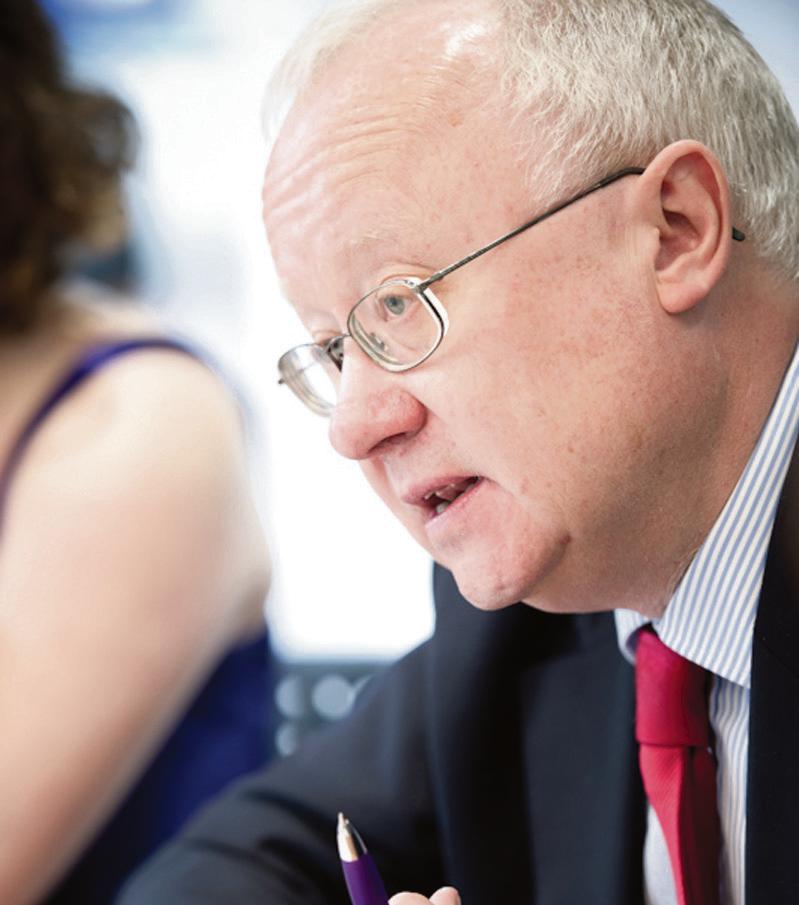WELSH Public Services Minister Leighton Andrews did not pull any punches when making the case for reform of local government. Highlighting events

local government.
in Pembrokeshire as an example of why reform was needed, the minister heavily criticised the authority over the size of former chief Bryn Parry- Jones’s remuneration package and was scathing about the perks doled out to the man dubbed ‘Pensioner of the Year’ by Private Eye. Leighton Andrews gave a hint that he anticipated movement from the UK Labour Party on the controversial Barnett formula, by which public funds are distributed across the UK.
Responding to a question about the commitment in the 2011 Assembly Manifesto to redress the balance of public funding between the different parts of the UK, the Minister told The Herald: “Ed Milliband has made it clear that he wants to see a fair funding formula for Wales and he will, I am sure, have something to say about this at this weekend’s Welsh Labour conference.”
He also said that he was open to the idea of reforming Dyfed as a local authority area, from which Pembrokeshire gained hard-fought independence only eighteen years ago. Visiting Pembrokeshire to discuss local government reform and council leadership, the Minister said: “We want to see a very clear distinction between the role of leader of the council and the role of the Chief Executive. In many authorities in Wales, there is clarity and people understand their roles and the difference between the political leadership and the executive leadership of the authority. Other authorities, however, we regard as being officer-led.
I think councillors have been afraid to challenge senior officers and we have, I’m afraid, seen some evidence of this in Pembrokeshire.” On the issue of the Chief Officer’s remuneration he was equally forthright: “I do not think it is acceptable for any chief executive to have a car allowance that is over twice the basic pay of other council employees, or that it can be considered appropriate for a council chief executive to be offered a luxury car, like a Porsche, by the local authority.
I think that the situation we have seen here, in Pembrokeshire, has demonstrated that things have got completely out of hand. We have taken measures to tackle this by establishing an Independent Remuneration Panel to assess senior officers’ pay. In the White Paper, we speak about an Appointments Commission for Wales for senior council staff.
I think that is a proposal that is worthy of consideration.” Highlighting a policy area that will strike accord with opposition parties at County Hall, the Minister detailed proposals to ensure that councillors are accountable to their electorate: “We have a lot to say about the political leadership in the White Paper; including the way in which we think leaders should present a manifesto so that they can be held to the promises they make.”
Mr Andrews did not underestimate the size of the task he faces or the magnitude of the test ahead: “I would say on balance that most council leaders would prefer the status quo. But I do not think that is a viable option. We have seen over recent years, service failures in social services and in education services. When I was education minister, of course, I had to intervene in Pembrokeshire. We have seen a lot of stories about the perks and payoffs of Chief Executives, not least in Pembrokeshire and the scandal of the Porsche.
I think that the public are getting fed up with what has been going on with local government in Wales. I don’t think that anybody in an ideal world would have created a system with 22 councils.” He continued: “I don’t think it will be an easy sell. There will be widespread public debate on the issue and the discussions that are ongoing will not be finished by the time of the next Assembly elections in 2016. There will need to be a consensus to move forward in the Assembly and that will require at least one other party to come on board with the Welsh Government, in my view.”
The Herald pointed out that, on the basis of what Carmarthenshire Council Leader Kevin Madge, a Labour member, had told it last year, that there was not even consensus within the Labour Party on local government reform. Acknowledging the point with good humour, Mr Andrews told us: “There is division in every political party within Wales, based on the conversations I’ve had. I think that is inevitable. Change of this nature needs a lot of discussion and, let’s be honest about this, there are a lot of vested interests involved in the process. There has been a lot of conversations over the last twelve months and those discussions will continue.”
We asked the minister about the prospect of forcing councils to merge, pointing out that Ceredigion had declined the chance to discuss merger with Pembrokeshire when it was the Williams Commission’s preferred option: “I am going to meet the Ceredigion leader later. While the Williams Commission suggested a merger with Ceredigion, it also set out the option of reforming Dyfed as a local authority area. So, there is more than one option to consider going forward.”
We asked how the reorganization would be funded, bearing in mind that councils are feeling the effect of Westminster’s cut in funding to the Welsh Government, which then has to pass on those cuts to local authorities under its control: “These are tough times, and tough times for everybody within local government. There is a cost to merging and a cost to not merging. We have given councils the opportunities to collaborate better together, to look at appointing officers together and save council tax payers’ money.
They have failed to do that and the opportunity costs of not merging are sometimes overlooked.” It seemed from his answer that the minister thought that the savings made would fund the costs of mergers. We asked whether that was really the case: “Ultimately I think that will be true. We have seen a number of estimates of the level of savings that will be made. A review commissioned by the Welsh Local Government Association suggested that savings of £65m a year could be made.
Those are very substantial savings. We will look at all of the costings as we look at our proposals.” One particular proposal that has attracted a lot of comment is that of term limits on service both as a councillor and as a member of a council’s cabinet. We asked whether the Minister would lobby for term limits for AM’s, as well: “I’m relaxed about that. We don’t have a government policy on it. However, we don’t have the powers to set term limits for Assembly Member: that is reserved to the UK government.”
















Add Comment